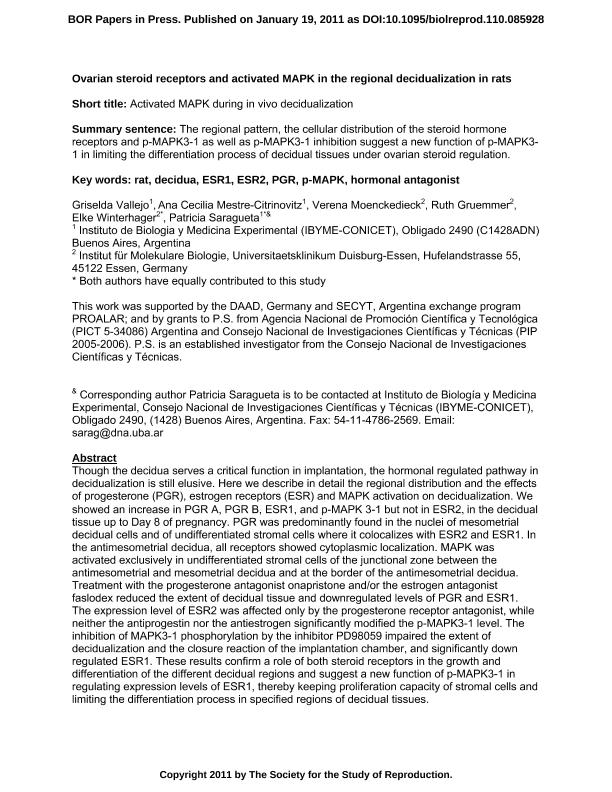Artículo
Ovarian steroid receptors and activated MAPK in the regional decidualization in rats
Vallejo, Griselda ; Mestre Citrinovitz, Ana Cecilia
; Mestre Citrinovitz, Ana Cecilia ; Moenckendiek. Verena; Grümmer, Ruth; Winterhager, Elke; Saragueta, Patricia Esther
; Moenckendiek. Verena; Grümmer, Ruth; Winterhager, Elke; Saragueta, Patricia Esther
 ; Mestre Citrinovitz, Ana Cecilia
; Mestre Citrinovitz, Ana Cecilia ; Moenckendiek. Verena; Grümmer, Ruth; Winterhager, Elke; Saragueta, Patricia Esther
; Moenckendiek. Verena; Grümmer, Ruth; Winterhager, Elke; Saragueta, Patricia Esther
Fecha de publicación:
05/2011
Editorial:
Society For The Study Of Reproduction
Revista:
Biology Of Reproduction
ISSN:
0006-3363
e-ISSN:
1529-7268
Idioma:
Inglés
Tipo de recurso:
Artículo publicado
Clasificación temática:
Resumen
Though the decidua serves a critical function in implantation, the hormonal regulated pathway in decidualization is still elusive. Here we describe in detail the regional distribution and the effects of progesterone receptors (PGR), estrogen receptors (ESR), and MAPK activation on decidualization. We showed an increase in PGR A, PGR B, ESR1, and phosphorylated MAPK3-1 proteins (p-MAPK3-1), but not in ESR2, in the decidual tissue up to Day 8 of pregnancy. PGR was predominantly found in the nuclei of mesometrial decidual cells and of undifferentiated stromal cells where it colocalizes with ESR2 and ESR1. In the antimesometrial decidua, all the receptors showed cytoplasmic localization. MAPK was activated exclusively in undifferentiated stromal cells of the junctional zone between the antimesometrial and mesometrial decidua and at the border of the antimesometrial decidua. Treatment with the progesterone antagonist onapristone and/or the estrogen antagonist faslodex reduced the extent of decidual tissue and downregulated the levels of PGR and ESR1. The expression level of ESR2 was affected only by the progesterone receptor antagonist, while neither the antiprogestin nor the antiestrogen significantly modified the p-MAPK3-1 level. The inhibition of MAPK3-1 phosphorylation by PD98059 impaired the extent of decidualization and the closure reaction of the implantation chamber, and significantly downregulated ESR1. These results confirm a role of both steroid receptors in the growth and differentiation of the different decidual regions and suggest a new function for p-MAPK3-1 in regulating expression levels of ESR1, thereby maintaining the proliferation capacity of stromal cells and limiting the differentiation process in specified regions of decidual tissues.
Palabras clave:
Endometrium
,
Progesterone
,
Decidualization
,
Reproductive Tract
,
Rats
Archivos asociados
Licencia
Identificadores
Colecciones
Articulos(IBYME)
Articulos de INST.DE BIOLOGIA Y MEDICINA EXPERIMENTAL (I)
Articulos de INST.DE BIOLOGIA Y MEDICINA EXPERIMENTAL (I)
Citación
Vallejo, Griselda; Mestre Citrinovitz, Ana Cecilia; Moenckendiek. Verena; Grümmer, Ruth; Winterhager, Elke; et al.; Ovarian steroid receptors and activated MAPK in the regional decidualization in rats; Society For The Study Of Reproduction; Biology Of Reproduction; 84; 5; 5-2011; 1063-1071
Compartir
Altmétricas



